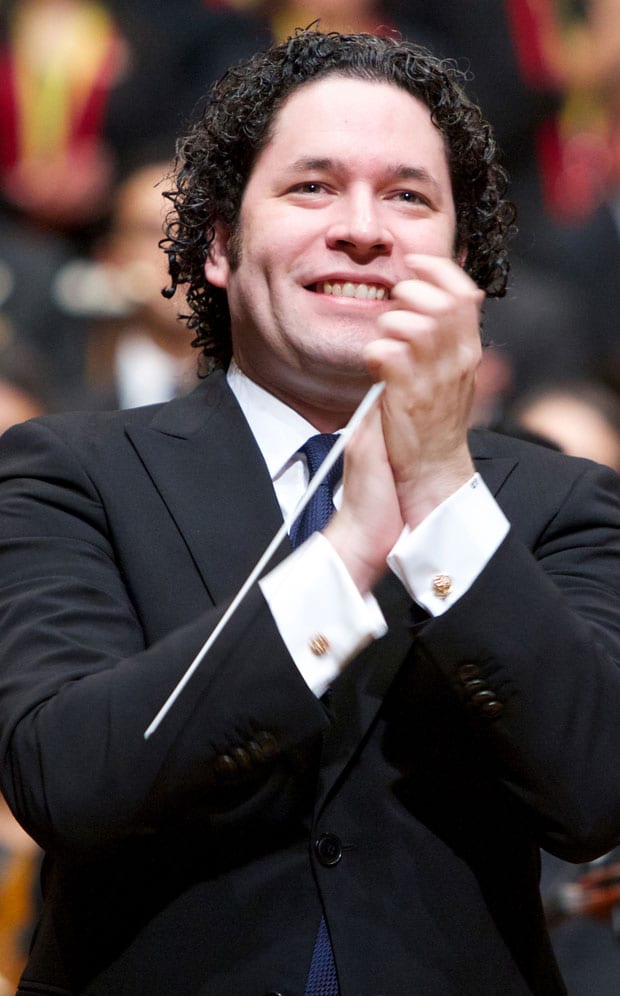He is and has been the most important face of Venezuela’s chamber music. His internationalization was inevitable when he began to direct the Symphonic Orchestra wit only 15 years of age. After that he became the main Director of the Symphonic Orchestra when he was 18 years old. Being such a young director, the most imporatnt musicians and world composer where observing his every move.
The man
Gustavo Dudamel is a name that has been fresh in the latest news related with orchestral direction.

All of this, since the moment in which the director of the Philharmonic Orchestra of Berlin, Sir Simon Rattle, announced that he wouldn’t renew his contract when it finalized at 2018. The name of Dudamel along with other great directors such as the Argentinean Daniel Barenboim and the German Christian Thielemann have been considered as strong as possible successors.
This is not a surprise
In 2000 he did his first tour in Germany with The Symphonic Orchestra, Simon Bolivar and two years after he was invited to attend the Berlin Philharmonic to study under the tutelage of the same Rattle; being an exception because the orchestra academy from the German capital accepts only instrumental musicians.
However, it was in 2004 when his talent was discovered in the rest of the world because he won the first price in the first edition of the directing contest Gustav Mahler, which is celebrated every three years en Bamberg (GE), and a year after he received the Price Beethoven Rings contest in the Beethoven’s International Festival in Bonn.
From that moment, Dudamel has had the opportunity of directing the most important and renowned orchestras around the world and the Berlin’s philharmonic is aware of this. The Venezuelan has been the director who has taken the baton as a guest more times for the last years.
But what has made Dudamel “eligible” for directing the orchestra that most people consider the world’s premier orchestra?
Beyond his impressive curriculum, in which he has been working since he was so little, his versatility in the podium has made him earn the respect from musicians around the world and also has let him winning the audience’s sympathy, an important factor in any cultural branch.
After his last presentation in Berlin, in mid- June some German mass media critics (among them Der Tagesspiegel and RBB Radio Berlin Brandenburg) filled with pride the Venezuelan and stood that his unique, his technique and his musical and intellectual acuity, would possible establish him as the main as the main baton of the Berlin´s philharmonic.
Also, the public gave a positive sign when the tickets for his 3 concert dates in Berlin were all sold out.
However, his age is also one of its drawbacks for this position. Many critics say that Dudamel is still too young to take charge of this orchestra and also argues that his “informal” style of directing little resembles the traditionalist aspects of the Philharmonic.
xcluding these subjective aspects of each critic or musician it is also a fact that the Venezuelan is currently the principal director of Los Angeles Philharmonic, an orchestra with which has just extended his contract until 2021.
National Pride
Outside the stages, Dudamel is also important for his work as a member of the System – the Venezuelan musical initiative that since 1975 is offering underprivileged kids the possibility to access to classical music instruments. He is the promoter of this educational model in different European countries and also in North America.
If we add his compromises and his achievements to his triumph in the Grammy Award 2011 in the best orchestral interpretation category with the Los Angeles Philharmonic we can say that we have in front of us a true celebrity. His agenda is full with middle term and long-term compromises.

However, the main reason for being so proud of him is that despite his international recognition and his multiple booked dates with orchestras around the world, Gustavo Dudamel has not forgotten, not for a single moment, his origins and he still directs the Simon Bolivar Symphonic Orchestra in Venezuela. He is continuously opening new ways and paths to musicians from countries where the access to music has been always restricted.


